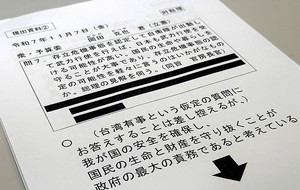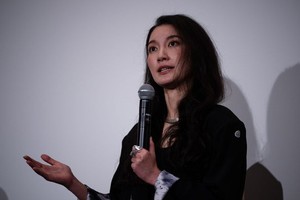THE ASAHI SHIMBUN
March 6, 2021 at 18:55 JST
The incoming commissioner for the Agency for Cultural Affairs is an accomplished composer who penned some of the biggest pop hits of the 1970s, which seemingly makes him ideal for the job.
But Shunichi Tokura may find himself the focus of controversy due to past positions he held.
The Cabinet of Prime Minister Yoshihide Suga on March 5 approved Tokura, 72 as the new commissioner. He will take over from Ryohei Miyata, whose two-year term ends on March 31.
Tokura wrote many of the hits for Pink Lady, a popular female duo in the late 1970s and early '80s.
Eyebrows were raised about his latest post because he once headed the Japanese Society for Rights of Authors, Composers and Publishers (JASRAC) and later served as a special adviser. JASRAC is the nation’s largest copyright management organization.
The Agency for Cultural Affairs oversees Copyright Law and as such is in a supervisory position in relation to JASRAC.
In light of Tokura’s past position in that organization, questions are bound to arise over whether he can maintain a neutral stance in dealing with JASRAC. For example, he would have to issue administrative edicts if JASRAC was found to be improperly managing copyright.
Koichi Hagiuda, the education minister, said at his March 5 news conference that he did not believe there was a conflict of interest.
“I believe he will be a commissioner who can look out for the interests of users, copyright holders and everyone else,” he added.
Hagiuda said he wanted Tokura to be in the forefront of moves to restart cultural activities once the COVID-19 pandemic is brought under control.
Tokura has been involved with JASRAC activities for 15 years and also served as chairman of the Asia-Pacific Music Creators Alliance, which JASRAC was closely involved in establishing.
In his position at JASRAC, Tokura lobbied the government to extend copyright to 70 years after the death of the composer, in line with standards in the West. The Copyright Law was revised in 2018 to make that change.
(This article was compiled from reports by Hikari Maruyama and Yasukazu Akada.)




















A peek through the music industry’s curtain at the producers who harnessed social media to help their idols go global.
A series based on diplomatic documents declassified by Japan’s Foreign Ministry
Here is a collection of first-hand accounts by “hibakusha” atomic bomb survivors.
Cooking experts, chefs and others involved in the field of food introduce their special recipes intertwined with their paths in life.
A series about Japanese-Americans and their memories of World War II